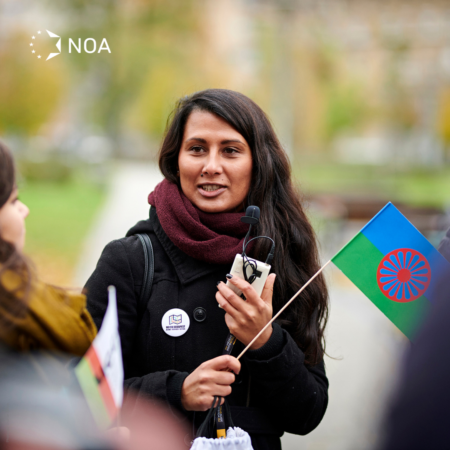Amplifying Roma voices in Hungary
August 2nd is Roma Holocaust Memorial Day, commemorating the 500,000 Roma murdered during WWII in Nazi-occupied Europe. More than seven decades after the genocide, Romani people remain a socially and economically marginalized community in Europe.
NOA (Networks Overcoming Antisemitism) spoke with Judit Ignácz, a Roma activist from Hungary, who works to counter prejudices about the Roma community and shed light on Roma voices. An estimated 700,000 Roma people live in Hungary today, according to the Council of Europe, the country’s largest ethnic minority. Yet “Roma history, literature, and culture are not taught in schools,” Ignácz explains. “Roma thematic content is not found in any books. This knowledge is lacking.”

The Uccu Roma Informal Educational Foundation, a civic organization where Ignácz works, is looking to change that. Using tools of nonformal education and workshops, they provide factual knowledge to school students about the Roma community, in an effort to counter negative stereotypes and prejudices.
Uccu runs its programs in four cities connecting Roma and non-Roma youth to simply meet, talk, and get to know each other. “In theory, everyone knows that having prejudices against oppressed groups is not good. Some kids know because they learn that from their parents. But in practice they don’t really understand the concept,” Ignácz says.
Uccu is also assisting a future generation of Roma leaders. With 40-45 young Roma volunteers visiting schools, they are strengthening their Romani identity and creating a community and sense of belonging. In addition, the NGO organizes walking tours in Budapest’s “District 8,” commonly known as a ‘no-go-zone’ due to misconceptions about its inhabitants, partly consisting of Roma. Uccu is bringing people there to expose them to the real neighborhood and cut down the stereotyping.
It’s not an easy project. Hungary’s marginalized Roma have been exposed to the violence of far-right groups. Uccu was founded in response to the 2008-2009 attacks on Roma settlements by neo-Nazis who killed six Roma people, among them a 5-year-old Roma boy.
More recently, during the early days of the pandemic in spring 2020, hundreds of far-right extremists held an anti-Roma demonstration in Budapest in response to a football feud stabbing, yelling slogans about ‘gypsy criminality.’ Angered about the situation in their country, Ignácz and a group of friends went on Facebook Live simply in order to share their opinions and raise their voices. They then organized a series of Facebook Live talk shows, becoming the brand Ame Panzh (‘We 5’) on TV Baxtale, an online and informal Roma media group where they speak about issues affecting Roma. Topics ranging from racism, police, and school segregation, to diversity inclusion, intersectionality, gender & sexuality, depression, and burnout.
Roma voices are simply missing in mainstream media, Ignácz explains. So they had to do it themselves: “One of our aims is to get our content in mainstream platforms. Amplify our voices.”

 NOA is co-funded by the Rights, Equality and Citizenship Programme (2014-2020) of the European Union
NOA is co-funded by the Rights, Equality and Citizenship Programme (2014-2020) of the European Union